Parish uprising: one tiny Anglican church, its gay organist, and an almighty row
A bishop’s hardline views on gays has triggered a parish uprising in defence of a regional NSW church organist and his retired public servant husband.
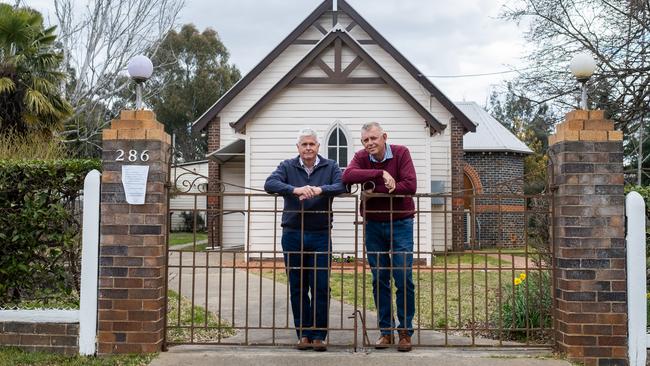
That they should ever have met and fallen in love is miraculous. Retired public servant Peter Grace, 61, grew up in a big Catholic family in the heart of the NSW grain belt at Gunnedah, where he was an active member of his local church. He was the one who picked up the elderly parishioners and drove them to church on Sundays, and to the doctor during the week. He was always available to help set up church functions. He’d been on the parish council. The church has always been vitally important to him. “It fulfils a deep spiritual need I have,” he tells me. “A lot of people say, ‘Why do you have to go to church?’ And I tell them that I don’t have to go to church, I go to church because I need to go to church.”
Grace was a devoted member of the congregation and while it nourished him spiritually there was something missing in his life. He was in his late 50s and he’d never been in an intimate relationship. “I’d just accepted that I would be single and on my own for the rest of my life,” he says. He was lonely. He had a yearning for a partner and for the intimacy that came with that. The problem was that in the ideal life he imagined he could never envisage it being with a woman. “I was just really, really upset,” he tells me. “I kept a lid on it. For years I struggled. I was going to confession all the time… One day the priest just said to me: ‘Peter, you’re a good person. Do you think God really wants to see you beat yourself up like this?’ ”
Living a couple of hours’ drive away, across the plains and up in the high country at Armidale, was another Peter – music teacher Peter Sanders, now aged 57. He too was a lifelong churchgoer – he’d played organ in various churches most Sundays since he was 15 – and he’d also had his share of struggles. Sanders had been married and has four kids. He’d been through a “terrible, awful divorce”. And then his father fell desperately ill. “I was 43 and my father, who was on his deathbed, said he wanted to see me,” Sanders explains. “He said, ‘You know your brothers and sister and I have been talking, and I’ve discussed it with your mother. We see that you have lots of men in your life. We feel that you are wasting your life and you should be having a relationship with one of them’.”
It was an incredible moment. The burden of despair and self-loathing lifted. “To hear those words from my father, and to know that I was accepted by the family, was just incredible,” Sanders says. His dad died three days later.
A few years ago, the two churchgoing Peters met through a dating app. What was on your profiles? I ask in jest. Good Christian man seeking good Christian man. Must enjoy tea, scones and piano singalongs… The pair look lovingly at each other and smile. “Something like that,” says one. “We were both searching for a soul mate… there wasn’t much point in getting into a relationship with somebody who didn’t have some sort of faith or belief,” says the other. And so, aged almost 60, Peter Grace moved to Armidale for his first ever relationship.
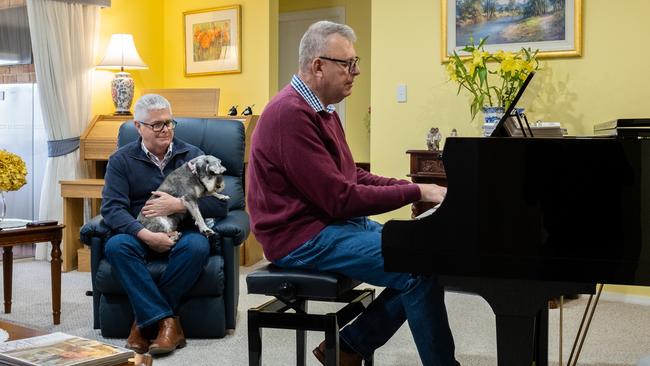
“I was going to attend the Catholic Church but Peter was playing the organ at St Mary’s,” Grace says. A small weatherboard and brick Anglican church away from the CBD in west Armidale, St Mary’s is ministered by a roster of priests. It’s a refuge for those wanting a cosier atmosphere than at the city’s grand and cavernous St Peter’s Cathedral, designed by the revered colonial architect John Horbury Hunt. “From the very beginning I just felt very loved, accepted and supported there,” Grace says of St Mary’s. He joined one of its committees, planning the celebration for the church’s 125th anniversary.
In February 2020, with the blessing of Peter Sanders’ kids and Peter Grace’s elderly Catholic aunts, they were married in a civil ceremony at Coffs Harbour. Their friends at St Mary’s were thrilled. There was great delight in their later-life love story. “We never felt the slightest bit uncomfortable at St Mary’s,” says Sanders.
But not everyone was chuffed to learn they had wed and were living contentedly in a loving relationship. On a chilly April morning this year, in his very first sermon to his new flock, the new Bishop of Armidale, Rod Chiswell, laid down the law as he saw it. Chiswell, a former civil engineer, is the son of Bishop Peter Chiswell, who ruled the same highlands diocese for 23 years until his retirement in 1999. According to Bishop Chiswell Jr, things are grim in Anglicanism. “Opposition to the Gospel is growing,” he cautioned.
Chiswell warned his parishioners that within the church there were false believers, “men of immoral character and conduct” who peddled a “counterfeit faith” and were “leading other Christians astray”. These imposters believed that talk of sin and judgment and hell were offensive, even hateful. He told the gathering it was his duty to confront the wicked people, even though he expected to be persecuted for his stance. He quoted influential US Catholic preacher Cardinal Francis George, who reckoned dark days lay ahead for Christians who stood up for their beliefs. “I expect to die in my bed,” he said, quoting the cardinal. “My successor will die in prison and his successor will die a martyr in the public square.”
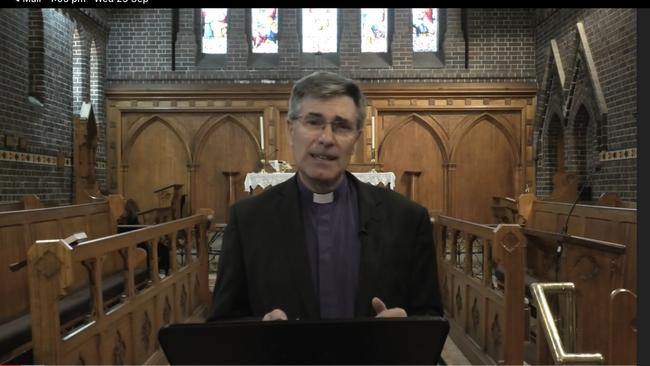
The Bishop told the congregation that when he recently moved from his previous parish his staff gave him a card. He shared it on a projector beamed above the pulpit. It depicted a famous Gary Larson cartoon of two deer standing in a forest, one with a marking on his belly in the shape of a target. “Bummer of a birthmark, Bish!” read the altered caption, making the Bishop the one with the target. And then he got to his point. “We live in turbulent times, the Australian Church, particularly with attitudes towards homosexuality and gender fluidity.”
This was his introductory sermon and he delivered it at various churches throughout the diocese. “He came out all guns blazing on day one,” said one woman who heard it. Another said he sat wondering if any of the kids in attendance were struggling with their sexuality and how the Bishop’s sermon would affect them. “He was using the pulpit as a weapon,” says Sanders, “rather than as an act of love, to share love, to promote love.”
Word somehow filtered through to the hierarchy of the diocese that the organist at St Mary’s was married to a bloke and, not long after Bishop Chiswell’s men-of-immoral-character sermon, the two Peters were called in for a series of meetings with church delegates and officials. Versions vary about what went on in these meetings and witness statements have been gathered and signed. “Their intent was to get rid of us,” Sanders says. “They told us we could remain friends but we had to separate and be celibate… they told us that with our current lifestyle we wouldn’t receive salvation. I said, ‘We love and care for each other, and you expect us to throw it all away?’”
In an email to me, Bishop Chiswell says he was acting out of love. “We seek to introduce people to Jesus and help them home to heaven,” he wrote. “His design for marriage is between a man and a woman and sexual expression only within that relationship.” He claims the men were not asked to leave the church. “They are free to return at any time,” he says. However, there is a caveat: “Return to any voluntary roles formerly held would be subject to the outcome of ongoing pastoral conversations in the light of the Scriptures.” They’d have to end their marriage.
What began, from the Bishop’s point of view, as “a pastoral conversation to encourage repentance and faith” has become a full-blown war between the Bishop and his flock. The St Mary’s congregation is outraged at the treatment of the two Peters. The entire management committee of the church has resigned. Attendance has plummeted. And a prominent Sydney silk has been retained to take on the Bishop and the diocese. Still, the Bishop refuses to budge. “This is not about punishing people,” he says, “but trying to help them in their relationship with God.”
The parishioners are equally defiant. “We want our church back,” one of them says. “It belongs to us, not them.” A meeting of the St Mary’s congregation voted 31 to two to have the two Peters returned to their positions in the church.
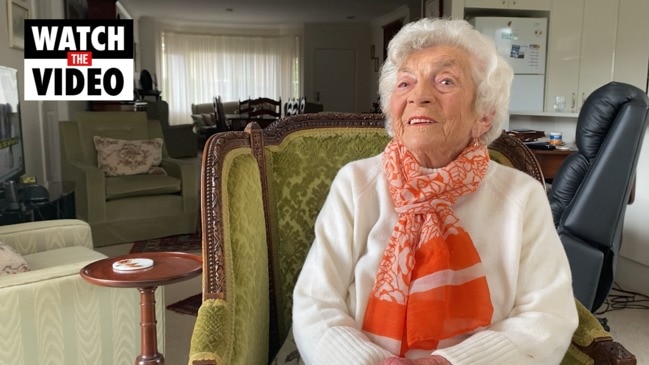
“Can they just get out of people’s bedrooms?” says an exasperated Thelma McCarthy. “If people are loving and caring, what goes on in their private lives is none of anyone else’s business. We’ve moved on from all of that. We eat meat on Fridays, divorced people take communion…” And people of the same sex can marry. McCarthy, a long-time member of the St Mary’s congregation, says she doesn’t want to see a return to ‘the black-ages days’. “They’re saying it’s their church and they’re quoting these passages from the Old Testament,” she says. “This is not the loving church that I’ve always known all the years I’ve been an Anglican.”
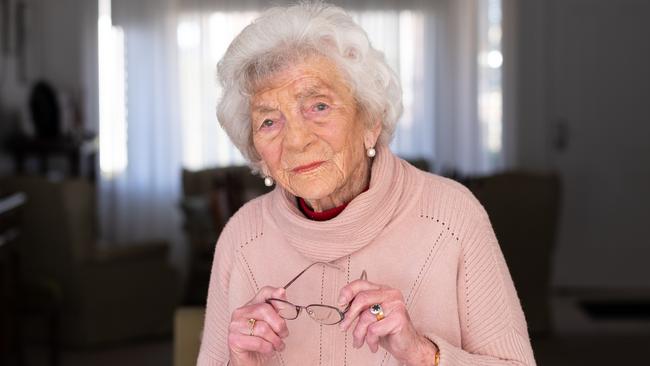
As a cadet journalist on The Armidale Express in the late ’80s I knew Thelma McCarthy as one of a cohort of formidable women who ran the city. Having fibbed about her age to join the RAAF as a 17-year-old wireless operator, she rose to the rank of sergeant. She’s one of the last remaining World War II veterans in the district and now, at the age of 96, she’s leading the charge to have Peter Sanders restored to his place behind the organ at St Mary’s, with Peter Grace in the pews, listening on. “He plays that organ as if it was magic,” she says. “He and his partner have become such an integral part of our community.”
McCarthy was at some of the meetings between the congregation and the church hierarchy. “My God, she cut loose,” says someone who was there. “It was a sight to behold, this 96-year-old little-old-lady – she’s four-foot tall – giving it to the Bishop and the Dean.” McCarthy says it’s important that people like her step up, not only for the two Peters but for the direction of the church. “The Christian teaching is about loving and giving and caring – not condemning,” she says. “We have to take a stand.” She says what the Bishop is proposing is cruel and wrong. “They say they want to give the two Peters counselling – it’s counselling to basically destroy their marriage.”
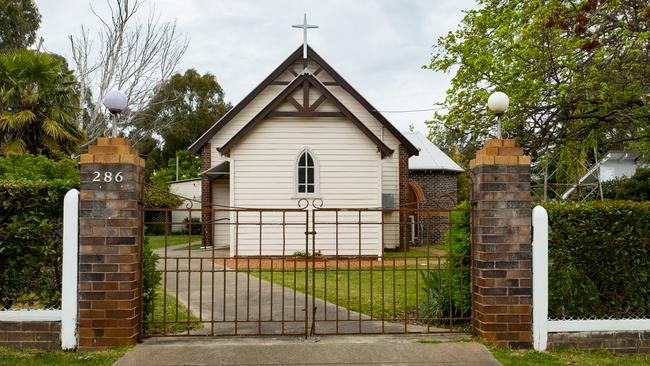
The 40-odd folk who used to warm the pews at St Mary’s, and who are backing the two Peters against the Bishop, are hardly radical anarchists. One of them is Alan Wilkinson, a retired English and history teacher who spent his career teaching the sons and daughters of the landed gentry at the city’s two private Anglican schools, The Armidale School (TAS) and New England Girls’ School (NEGS). He also sings in the TAS Chapel Choir. He’s heard the Bishop’s men-of-immoral-character sermon twice – once at the cathedral and on another day at the tiny bush chapel at Gostwyck, which was celebrating its 100th anniversary. “It was very odd and very inappropriate for the occasion,” says Wilkinson. Besides, there were children in the audience and in the choir. “What if one of the students happened to be gay?” he says. “It would have a very negative impact on that student – they’d feel at fault and a pariah. It would have turned them away from the Church, if they thought that’s what it represented.”
Wilkinson says he was “certainly amazed and a bit shocked” that Chiswell would begin his relationship with his new congregation with this sermon. “The Bishop specifically referred to homosexuality in that sermon and I found it a bit odd that he would choose that particular issue to introduce himself. It confirmed my view that the clergy have hang-ups about that particular issue…If we took the Bible in its literal sense there are so many other things that are considered sinful. Why aren’t those things being mentioned from the pulpit if homosexuality must be?” He says the new Bishop has made it clear that “his mission is to deal with homosexuality”.
Wilkinson says it’s been “completely demoralising” for the St Mary’s congregation. Before the Peters were hauled in, about 40 people regularly attended; the number had dropped to about 17 before lockdown. Wilkinson says the Sunday services had become “pretty atrocious” but he is determined to keep going – to advocate for change from within.
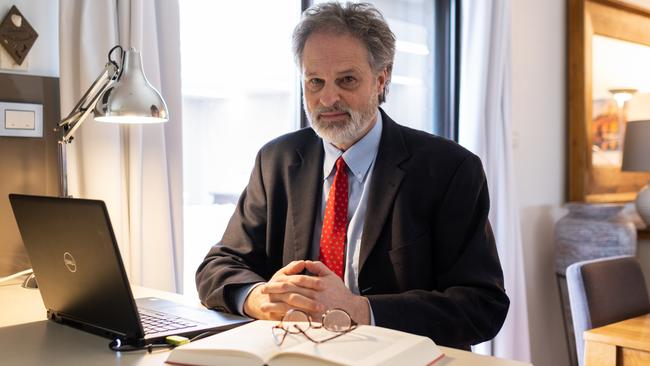
Another congregant pushing for Peter Sanders to be reinstated as the organist, and for Peter Grace to sit on the Anniversary Committee, is Thomas Fudge, a Professor of Medieval History at the University of New England. Fudge has studied the Bible in modern and ancient languages. He’s an academic expert on it and the history of the church. At one point he held a discussion with the Bishop’s offsider, the Dean, Chris Brennan. “I made the point to the Dean that there’s no place for the Church in the bedrooms of the parish,” says Fudge.
The professor says that if those who control the Armidale Diocese want to argue literally about interpretations of the Bible, they won’t have much of a congregation left. The Bible mentions a litany of sins – and the church has had an even longer list – but the Bishop is not obsessed about the divorced, the masturbators, the unwed, the gluttonous, the greedy, the slothful, the envious… “But as a historian of Christianity, what I can tell you is that the Church has long been obsessed with homosexuality.”
In a phone call, the Bishop tells me he has often had difficult conversations with people in his congregation, other than homosexuals, whom he believed were living a sinful existence. In an email to him I ask if he will conduct an audit of the diocese’s office holders and employees to enquire about their status as divorcees or couples living out of wedlock. He replies: “The other category of person you have mentioned may or may not be wilful sinners. However, I would encourage all clergy in our diocese to be exercising ongoing spiritual care in the light of God’s word and to address any kind of sin in the life of their congregation when it becomes apparent… This is not to punish people but to help them in their relationship with God.”
One person tells me that if the Bishop does an audit to find all the unmarried, the divorced, the lesbians, the gays, the masturbators… “and weeds them all out of every Church position in every parish in the diocese, it’ll collapse”.
This parish uprising is taking place against theloomingreligious discrimination laws, which Prime Minister Scott Morrison promised to introduce in his first term. In a recent interview with The Australian, Attorney-General Michaelia Cash seemed to be trying to dampen the expectations of some religious organisations, saying demands from some religious leaders for wider protections for religious-affiliated institutions would be “constitutionally barred”.
Her comments have upset the more hardline Christian groups. “The Religious Discrimination Bill must provide meaningful protection for people of faith,” says Martyn Iles from the Australian Christian Lobby. “In particular, that employers will not be able to police the religious speech of employees on the employees’ own time. Former attorney-general Christian Porter’s first two drafts contained this protection. We expect that the Prime Minister, the Deputy Prime Minister, and Attorney-General Cash will not walk back from this.” The sort of legislation people like Iles are after would allow people like the footballer Israel Folau to freely express their views about gay people. They also want the right to sack gays from a broader range of their institutions.
Church organisations already have broad-ranging exemptions from anti-discrimination legislation when it comes to the employment of people in their core functions (except in Tasmania, and to a lesser extent the ACT, where employees of religious organisations have many of the protections of other workers). Religious schools and hospitals can already sack gardeners they discover are gay, and now religious leaders are seeking to broaden those exemptions. For example, in its submission to the second draft of the bill the powerful Anglican Church Diocese of Sydney – of which Armidale is as an acolyte – stated that it wanted the exemptions the church currently enjoyed to be extended and strengthened to include “faith-based aged care providers, hospitals, accommodation providers and campsite operators”.
A liberal Anglican minister, who didn’t want to be named, says we are witnessing “an Americanisation” of the religious right in Australia. “If the final bill is anything like the second draft of the legislation it would basically throw a spanner in the works of anti-discrimination laws,” he says. “It would make it impossible to bring complaints, unless you are a religious organisation.” He says the religious right has adopted many of the techniques of hard-right religious groups in the US. “They want to enshrine the rights of religious organisations to discriminate against gays… it would be incredibly divisive if adopted in this country.”
Dave Sharma, the small-l Liberal MP for Wentworth, says he and a group of like-minded Liberal parliamentarians have been pushing to ensure the gains made by the Marriage Equality legislation are not “undone through the back door by a bill that allows those rights to be detracted”.
Whichever way the legislation leans, it will be a major headache for Scott Morrison in the lead-up to the next election. On one side, groups such as the Australian Christian Lobby warn the Coalition to “not to walk back on this”. On the other side, how will members of the LGBTQI community working as cleaners, nurses and administrators in faith-based aged care facilities, hospitals, hostels, campsites and schools – and their family and friends – react to the prospect of being cast aside like a gay organist and his churchgoing husband?
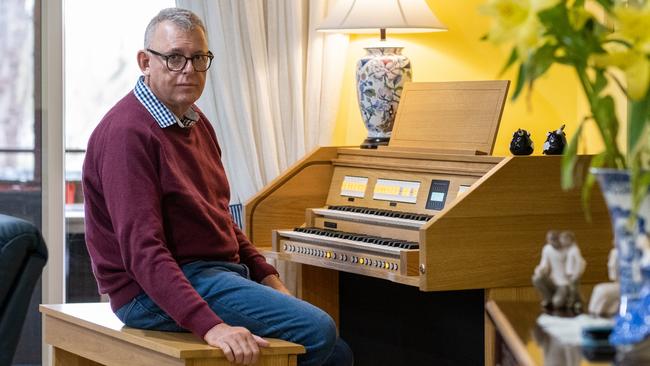
The St Mary’s congregation has turned to the law in a bid to return Peter Sanders to the organ and Peter Grace to the Anniversary Committee. They’ve engaged Sydney barrister Robert Angyal SC and the matter appears likely to end up before the NSW Anti-Discrimination Board. The lawyers representing St Mary’s congregation will argue the $25 a week Sanders was paid to play the organ made him an employee. Under existing laws the church can discriminate against certain employees, however the lawyers for the congregation will argue that in this case there were a particular set of circumstances that made it illegal.
Public opinion is on the Peters’ side. According to recent polls, 74-82 per cent of Australians oppose the right of religious groups to expel gay students or to sack gay teachers. A major academic study, soon to be published, will show that even among devout and religiously observant people attitudes towards homosexuality have softened and a majority now support same-sex marriage.
This disconnect between the clergy and their flock is not confined to the Anglican Church. Francis Sullivan, a prominent Catholic who represented the church at the Royal Commission into Institutional Responses to Child Sexual Abuse, says this issue is tearing apart the fabric of the Catholic Church in Australia. “The church is not meant to be a bulwark against common sense and the evolution of human development,” Sullivan says. “It is meant to help us have insight… the flood of people leaving the church is a gobsmacking revelation that the church has lost its relevancy to how people go about their everyday lives.” But still, he says, the churches continue to “run around” with a long checklist going, “Yep. Na. Yep. Na”. “God has moved on. I hope the churches can catch up.”
Sanders also hopes the church can catch up. “We just want things to return to how they were, and for an apology,” he says. “It’s made us question everything. We were so happy and it has taken a bit of a shine off how we were feeling… If we could afford to leave Armidale, we would.
“The church had been such an important part of our lives. We all just want a church that is there to build us up in life. That doesn’t mean we don’t have to make amends when we do something wrong and apologise to Jesus.”
The Bishop and his followers, Sanders believes, have become obsessed with rules and regulations. “But the Christian faith is all about love and graciousness… Christians are not better than anyone else, they’ve just come to realise that you need faith to get through life,” he says. “Life is easier if you’ve got faith.”

